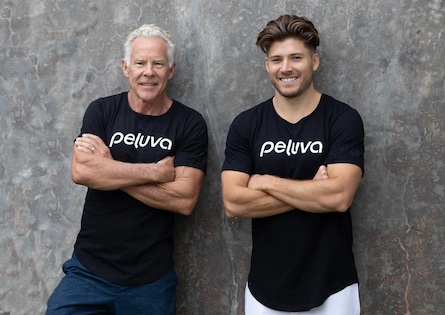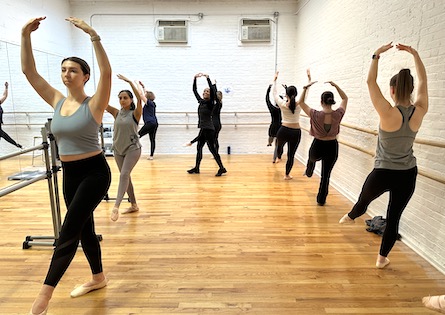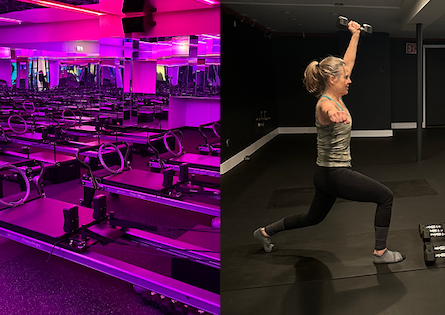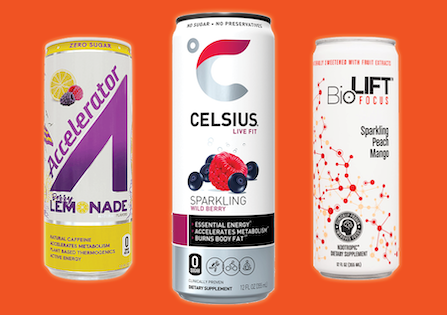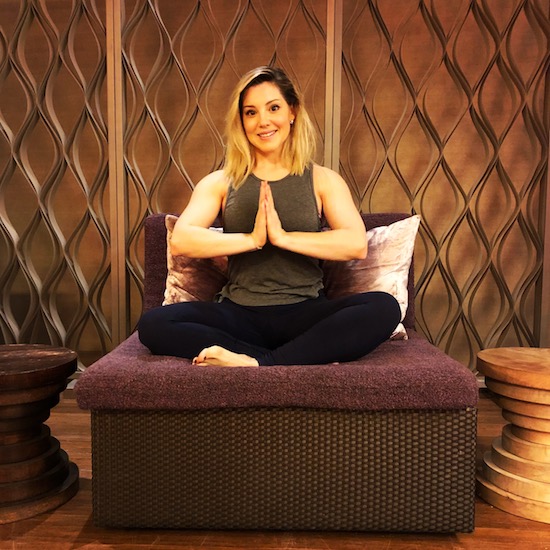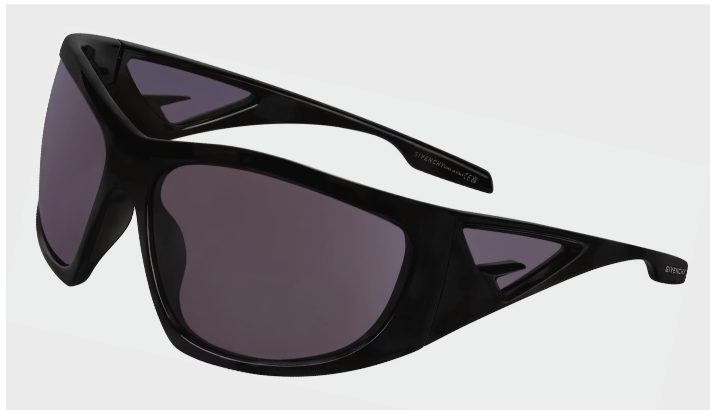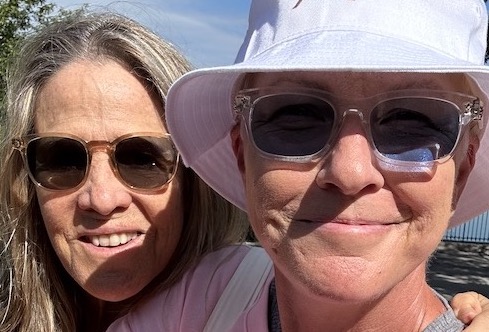AMANDA MURDOCK, DECEMBER 2017
I belong to Pure Yoga in NYC, a popular members-only yoga studio on the Upper East Side of Manhattan. There is one on the Upper West Side as well. As I have discussed before on STYLE of SPORT, I really don’t like yoga, but force myself to go as a counterpart to all the running and spinning I do. Like any fitness class you take, it’s about finding an instructor you like, and one of the first yoga teachers I found at Pure, whose class enjoyed, was Amanda Murdock. For me, that’s saying a lot.
I first took Amanda’s class back in 2013 during my annual 31 Days of Fitness feature. I remember thinking then that she was very skinny. With a ballerina’s physique and muscle definition, my assumption was she was or had been a dancer. I didn’t presume the other explanation. It was only a couple of years ago, when I noticed her body started to change and become much healthier looking, that I wondered if she might have had an eating disorder. The Pure community is fairly tight knit, and when I asked another instructor, a friend of both of ours, she told me that had been the case.
Amanda has gone from about 90lbs. to 120lbs. since I have been a member of Pure. As a fitness instructor Amanda’s transformation has been very public. I started thinking about what it must be like to have a classroom of eyes staring at you every day — going through such a challenging and emotional journey while on display. I wanted to know her story and tell her story. Although Amanda and I were friendly, our only contact was in class, and I was very hesitant to ask her about something so personal.
The same instructor who told me about Amanda’s eating disorder, assured me she would be okay with my asking her about it, and so here we are. These are the kinds of stories I am always honored to feature on STYLE of SPORT and humbled by the people who share them. Amanda hasn’t spoken about her eating disorder publically before.
STYLE OF SPORT: Thank you so much for sharing your story. For those of us who take fitness classes regularly, what keeps us coming back is the instructor as much as the workout. You find those teachers you love, and feel like you know them well, but often you don’t really know them at all. I did a story a few months ago about a SoulCycle instructor who had a stroke, and taught throughout her rehab. We knew something was wrong, but no one really knew what happened. She told me, “People don’t go to a bar to hear the bartender’s problems.”
AMANDA MURDOCK: You have to leave your problems at the door. I learned that very early on because my mentor taught me you show up for the students. It’s not about you. You are happy and cheerful and then you can break down when you leave. That’s been instilled in me since I first started in fitness.
SOS: When it seems like something is off with the teacher we want to know why, but yes, we come to class to feel good, not bad.
AM: It’s finding that balance between opening up and being vulnerable, but still appearing strong and together. When bringing in personal information, I walk that line between how much do I share and how much do I hold back? In yoga, there is that consciousness so people tend to be more open and receptive.
SOS: Well this is your opportunity to tell your story outside of the classroom. Will you take me through how this started? Where are you from first of all?
AM: I’m from South Carolina. I have two older sisters, a normal family life, but I’ve always been a perfectionist and Type A. In high school, it was just over-exercising.
SOS: So you felt like you were fat?
AM: Yes… or that I could lose weight. I think there’s always that, ‘If I looked this way, my life would be XYZ.’ But that’s not true ever. My freshman year in college my friend and I started the Atkins diet. That was where it began. Let’s eliminate things. That’s where it becomes a slippery slope. I’m the person who will always take it to the extreme. If I’m going to do it, I’m going to do it 100%. So then it pretty much became eliminating all food. Let me see how little I can eat. Let me just try and see what happens.
“It’s not one thing. I think it was a culmination of things. My mom asked, ‘Were you raped?’ There was never an event. There doesn’t have to be. I think that is true for a lot of people. I wish there was one thing I could pinpoint because it would have been a lot easier. For me it was control. I like being in control. I felt like I didn’t have control and this was a good thing to control.”
SOS: We’re still talking freshman year?
AM: Yes, we’re in summer now.
SOS: Weight-wise, where were you? How are you looking at this point?
AM: I had lost weight during the year. It wasn’t anything that extreme, but during that summer I probably went down to about 85 lbs.
SOS: How tall are you?
AM: I’m 5’2”. I was in a sorority and when I went back to school we had rush. People were like, ‘Who the hell is that?’ It’s sorority and everybody talks, so I was already used to that, but this was all anybody was talking about.
SOS: How much weight had you lost would you say?
AM: I wasn’t big. I had probably weighed 125-130lbs.
SOS: So you lost like 40lbs in a year?
AM: Pretty much. I clearly didn’t look right. I was doing eating disorder things, like I could only eat at certain times. Only eat certain foods. That’s what happens when you have an eating disorder. It gets very regimented. You get very obsessed and you have certain habits that you do while you eat.
SOS: Can you give me an example?
AM:I had to eat dinner… I can’t remember what time it was, but let’s say 6pm. If it was after, like 6:30, I wouldn’t eat. I would get really fixated. I don’t know why.
SOS: And what would that dinner be?
AM: I wouldn’t eat all day. Maybe Jello or something. Or maybe deli meat. And then at night I’d have like a salad and chicken. I was obsessed with artificial sweeteners. Everything had artificial sweetener in it or on it. It was disgusting, but when you’re in it, you’re like this is delicious. Whether it’s cutting your food or eating it in a weird way, there are a lot of different things people do with their food that’s not “normal”. I get into patterns and it was a pattern. If I did something different, it didn’t feel right. It created anxiety. Being in social situations was extremely challenging.
SOS: Without getting too personal, or as personal as you want to be, why do you think you were doing this?
AM: It’s not one thing. I think it was a culmination of things. My mom asked, “Were you raped?” There was never an event. There doesn’t have to be. I think that is true for a lot of people. I wish there was one thing I could pinpoint because it would have been a lot easier. For me it was control. I like being in control. I felt like I didn’t have control and this was a good thing to control. I don’t do well with change. Being away at school, my grandmother was passing away, my mom had back surgery, my dad was always working… I needed someone to take care of me. It was a very physical way of asking for help without saying it.
SOS: How did you end up in treatment?
AM: I was at the University of South Carolina. I would go home every weekend. I didn’t want to be at school. I had no friends anymore. By the second semester I had to ask my parents to come home because I physically couldn’t do it anymore. I started seeing a therapist there and she told my parents I needed to go to a treatment facility. She was worried I was going to die.
SOS: How much did you weigh at this point?
AM: I was still the 80s range. My parents didn’t know where to send me. It wasn’t like this was a common thing.
SOS: In NYC this has become so prevalent. Luckily parents do have a quite a few options for where to send their kids for treatment.
AM: Not in South Carolina, and this was 18 years ago. There were a couple of places to go. There was The Renfrew Center in New York and a few places in California. My doctor ended up sending me to Wickenburg, Arizona to a place called Remuda Ranch. It was a Christian center and very faith based. I don’t think my parents knew that.
SOS: Why did you end up going there?
AM:That was the place my doctor knew. She said it was really good and had good success rate. It was very small and the work was from a more Christian standpoint. We had a Jewish girl come which I thought was so crazy. ‘Why is she here?’ But she was amazing. She was from NYC and walked in with these sunglasses and big jacket on. It was awesome. So New York!
SOS: How long were you there?
AM: I was there for 60 days. It was a 30 or 60-day program, but they really didn’t set you up for real life. They get you to stop doing your disorder. You’re eating normal food and your gaining weight, but then they send you off without the skills for the outside world.
SOS: How much weight did you gain there?
AM: I probably gained about 20 lbs. and weighed around 100 lbs. I remember because the number 100 scared me… a lot. I remember thinking, ‘I don’t want to go over this number. I want to get to this number. I’m okay at this number. Just leave me at this number.’ It’s always negotiations with an eating disorder, like ‘I’ll do X if I can keep Y’. It’s never, ‘I’m going full throttle into this. I’m going to hold a little bit back.’ There’s always that buffer.
“You can’t have a relationship with somebody else when you’re in a relationship with your eating disorder. I had zero social life, but as much as I hated it, I didn’t know how to change it. One of the things I regret now is I see 25-year olds going out and having fun. I don’t know what that’s like.”
SOS: What happened after you left there?
AM: I couldn’t go back to school because we were already into the semester, so I started taking community school classes in Spartanburg. I relapsed. Literally the day I got back I was doing my eating disorder again.
SOS: We’re you living at home?
AM: Yes.
SOS: You came home and boom, you just picked up where you left off?
AM: Pretty much.
SOS: Nothing sticks?
AM: No. I’m sure my parents were extremely frustrated but they were trying to be supportive. I felt so much guilt about what I did to them, but you hold this guilt inside and it makes it worse. It becomes a sticky situation because your parents want to be supportive but they become the bad guy. They said, “We’ve got to send you someplace else because you’ve already lost weight. You’re not any better.” They sent me to a place I highly recommend called Laureate in Tulsa, Oklahoma. My first visual of landing in Tulsa were these gigantic praying hands. The Oral Robert University is there. Laureate is affiliated with a hospital so you have a lot of medical stuff there, but you learned how to live in the real world.
SOS: How?
AM: They’d take us out. They’d take us to the movies. We’d go to restaurants. They’d take us to places to learn to maneuver these real-life situations.
SOS: How long were you there?
AM: I think I was there for 60 days, but I don’t know dates because it’s like Groundhog Day. You wake up and you do the same thing every day. Days and time just go on and on. I did the step-down program where you go to a halfway house. You’re still on campus at the hospital, but you’re living in a house. You can go to school, or have a part time job, but still come back and eat with everybody and have group therapy. You can still see the nutritionist and see your doctor. I must have been there for a very long time because my friends from college had already graduated. I was so ready to be done. I was so ready to get out and start having a life. I left the halfway house and got an apartment in Tulsa.
SOS: Where were you going to school?
AM: I was going to Northeastern State which is a university in Oklahoma, and working part time. None of the people I worked with or went to school with had any idea of any about my eating disorder. I looked sort of normal… thin, but normal. I ended up finishing my junior and senior year in one year. I just never stopped going to school. I took online classes, summer school, because in my mind I was still going home. I was still going to go back to South Carolina to see my friends again and I wanted to be caught up. But I never ended up going back to school. I ended up moving here to New York.
SOS: How did that happen?
AM: A friend from work, her sister worked at Rubenstein Communications in New York. Since I was in marketing she offered to pass my resume along. After a few months, they got in touch with me. I had a few interviews and they ended up giving me a job. I moved from Tulsa to New York, and well, we know I don’t do well with change…
SOS: Uh, oh…
AM: Any work I had done with not being so rigid, with structure and rules, and food rituals… I moved here and went right back to my old habits. I left work every day at 5pm because I had to be home by 6pm or 6:30 to eat. I had no friends. All the girls I worked with were 20-year olds. I couldn’t have the normal 20-something experience of going out and drinking with your friends. You don’t want the extra calories so you’re not going to drink. I lived in Astoria which didn’t help. I did not date. That was not even on my radar. I had zero social life. You can’t have a relationship with somebody else when you’re in a relationship with your eating disorder. But as much as I hated it, I didn’t know how to change it. One of the things I regret now is I see 25-year olds going out and having fun. I don’t know what that’s like.
“I loved yoga because it was something I felt powerful doing. It wasn’t powerful with a machine. It was powerful with my body. I could move and I felt graceful. I felt good at something which was so nice because you feel so bad all the time. It always felt like punishment going to the gym. With yoga, I actually really enjoyed it.”
SOS: Did you have any sort of self-awareness when you moved to New York that this might set you off?
AM: I took precautions. I got a nutritionist and a therapist here because you want to build a team. That’s what they always say, build a team. But I was also like I’ve got this. I’m moving to New York and this is so exciting! I was so naive. I know now that I was ill prepared to deal with the pressure, but I didn’t even feel it because I was so numbed to everything. I didn’t even realize I wasn’t very good at my job. You were supposed to work these crazy hours, but I was out the door every day at 5 o’clock. Of course, you’re not going to advance.
SOS: How long did this go on?
AM: I worked at Rubenstein for about two years. I really was not happy at that job. It probably wasn’t the job though, I was just not happy with me. I left there and started working for a makeup artist on the Upper East Side. Her name is Kimara Ahnert – make-up, skin care, and everything. I loved it because I love all that stuff. I’m such a girl in that regard. I was her brand manager. She was actually looking to me for advice and listened to what I said. She treated me like an adult, like my opinion was valuable. Everybody from my parents to my sisters had treated me like I was sick. I was a scapegoat for everything. Your problem becomes everybody’s problem and your problem is blamed for everything, which makes it so much worse. And you don’t stand up for yourself because you feel like there is something very wrong with you.
SOS: We’re you still very skinny at this point?
AM: I’d say I was hovering in the 90s.
SOS: Just so I can have a visual, how much did you weigh when I first met you.
AM: I’d say I was probably about the same weight.
SOS: How did you get into yoga?
AM: My coworker suggested I start taking yoga. I told her I was not really supposed to exercise but I started doing it once a week with my mentor, Alanna Kaivalya. I just loved her class. It was when Pure first opened. I loved her message. I loved her energy. I loved yoga because it was something I felt powerful doing. It wasn’t powerful with a machine. It was powerful with my body. I could move and I felt graceful. I felt good at something which was so nice because you feel so bad all the time. It always felt like punishment going to the gym. With yoga, I actually really enjoyed it.
SOS: How did you go from there to teaching?
AM: Alanna told me about a teacher training program and said that I should do it. I told her I had really just started doing yoga, “I don’t think anyone wants me to be a teacher.” But she was like, “No, I think you should.” I have no idea why she thought that, but it was the best thing ever in my life. I got a mentorship with her and started teaching a community class. My poor students… it was 7am on a Tuesday, downstairs with bright lights on. I had no sense of ambiance, but people kept coming back. I have no idea why. Then I got a full-time class at Pure, and I felt like, ‘Oh yes! I have one class. Amazing!’
SOS: We’re you still working at Kimara Ahmet?
AM: My boss had opened store in Greenwich which didn’t do well. They had to close it and she couldn’t keep me on full time, but I was actually very excited because now I could pursue teaching yoga more. I happened to be at the right place at the right time, when Pure was starting to take off. We started getting people that wanted private yoga and there was an opportunity for me to take on more teaching and more students. They used to have a thing where if you were a new member you’d get a comp private session. I would take all the comps I could get and that’s how I started getting private clients. I started becoming a real teacher.
SOS: What year was this? Where were you with the eating disorder?
AM: It was 2011. The eating disorder was still going, but I was more social. I was able to break away from it a little bit, but was still very structured in what I ate and what I didn’t eat. I counted calories. I knew what was in everything — that gum, that water, that hot sauce. I’d calculate it. I’d honed that skill for a long time. I’d stopped seeing my therapist at this point. There’s only so much therapy, so much nutrition you can do. If you’re not going to do the work there is no point in going. I thought I was doing well. I got into relationship, but a very toxic one. He was a very nice guy – younger than me and very wealthy, but very OCD, and everything had to be a certain way. I was miserable and I started to lose weight. I had been teaching for 2 to 3 years at this point. Pure said that students were talking about my weight. They said told me, “You look sick. You need to gain weight or you can’t work here anymore.”
“I had to live with the embarrassment. I had to walk in front of these students every day. But I just kept going back to teach. I have a really strange resolve. I thought, ‘I will still give them yoga even though I feel judged and self-conscious. I’m going to do this for me. I will keep moving forward.’ I refused to fail.”
SOS: How did you react to that?
AM: It scared me. I loved working at Pure. I didn’t want to be fired. That wasn’t okay. It was enough to get me back on the right track. I felt like I had finally found my calling in being a yoga teacher. The fear of having something that I finally truly cared about taken away from me was the catalyst I needed to start to move me forward — to finally do the hard work of beating my eating disorder. I didn’t happen all at once but that was the moment.
SOS: How was it teaching when you knew students had been talking about you?
AM: I had to live with the embarrassment. I had to walk in front of these students every day. I also had in my mind that other teachers didn’t respect me because they saw me as “that girl with the eating disorder”. But I just kept going back to teach. I have a really strange resolve. I thought, ‘I will still give them yoga even though I feel judged and self-conscious. I’m going to do this for me. I will keep moving forward. I refuse to fail.’ I had a fire under me. It was like someone pointing out, ‘Your eating disorder is completely controlling you and you have zero control over your life. Is that ok with you?’ And I was like, ‘Oh hell no!’
SOS: How do you think you were finally able to make this shift?
AM: When you start to normalize something, it can be detrimental or it can be positive. Before it was detrimental, but I started to shift it to the positive. Over the years you have different pivotal moments. You start eating different foods. You hold the needle there. A different food becomes normal. Great, now let’s try a another food. You get better and better. It was a slow process, and my God, it took me 8 years from when I started teaching at Pure to now.
SOS: How do you feel now? Maybe it’s scary question, but are you scared of going back?
AM: No, it’s interesting. You hit a certain point and now I can’t imagine doing what I did then. I can’t imagine not eating. If I’m hungry, I’m going to eat. I’m still a really healthy eater but I do eat sweets and bread and things that I would never have thought I would. When I was in my eating disorder I would always imagine what it would be like to be where I am now. And now I can’t imagine how I was ever there.
SOS: I’ll share with you that I went through a binge eating period in my life. I’m on the other side of that now and have been for a long time, but I did the same thing. I could never imagine then being in the headspace I am now. What changed for me was running my first marathon, and all these trigger foods like carbs becoming my friend. They were fuel. It was a complete mind shift that has stuck with me, but you do wonder if you could ever go back.
AM: I always think it’s a slippery slope. For me I know my triggers. You can’t be scared of things. When something scares me, I know I need to do it – go towards it and explore that more. I think the biggest thing that has held me back is fear. Fear of food. Fear of being this weight. I’ve been all those things I was scared of, and I’ve had all the foods that I’m scared of, and it’s okay. I’m more focused on being strong and feeling good. Life for me is about experiences now. Before I never traveled. Now all I want to do is travel. I want to be out with people, because for so long I was so sheltered. Now I’m in the driver’s seat. Now I don’t let that fear hold me back. I missed out on so much. That’s why I was so interested in doing this story with you. I want people to know you lose out on so many of these little experiences in your life. You want those memories. You want that time.
SOS: I think fitness instructors who have been though real-life experiences have so much more to offer. They are not just talking the talk. The advice they share is real and you believe what they’re saying. I think you have that.
AM: I think the work that I’ve done, whether its leadership training or more advanced teacher training, has helped make me more knowledgeable and more competent. I realize I have value and worth and I am a good instructor. That took me a really long time and I’m still trying to find my voice in terms of how to relay what I know and the things I’ve experienced. What really took me to the other side was a leadership training program called Momentum. It makes you look at your fears, look at your patterns, look at your habits, look at how you react to people. It’s not about them, it’s about you. For me it’s been learning, ‘Oh, that person does not perceive me as this. I’m perceiving me as this. It’s my lens but I’m making it theirs.’
SOS: Yoga is sometimes prescribed now as part of recovery from an eating disorder. It is exercise that is allowed because it doesn’t burn too many calories. Working with instructors who have this shared experience can be therapeutic for both sides.
AM: So many people have told me I should use my knowledge of eating disorders. I haven’t been able to put it into practice yet. I’m still trying to figure out what is the most effective way to say something that will have meaning and touch somebody. I don’t want to overshare. I want to be authentic. I get scared because I don’t want to come off like I know better. With eating disorders your “hangry” all the time. You push everybody away because you’re in a relationship with your eating disorder. But if I can help one person then that’s great. Maybe this will be a catalyst for me to start speaking more.
SOS: I hope so. Your experience and your voice is so relevant. Eating disorders have become so prevalent and you hear so many similar stories. Family members often feel so helpless. You don’t want to say anything that might be a trigger.
AM: At this point you can’t trigger me. There were definite times in my life where everything and anything would trigger me. ‘You look great’… ‘Well, what do you mean?’ You dissect everything anybody says. There were times when my brain was working overtime making up things in my head. Now it’s just thank you very much.
SOS: And I’ll wrap on that and say thank YOU very much!
